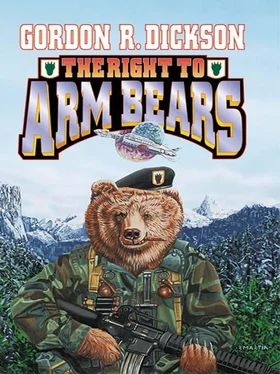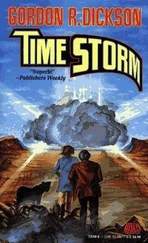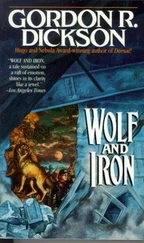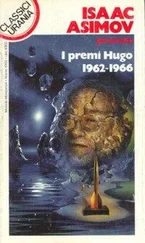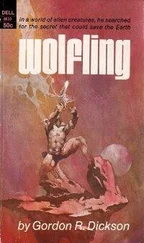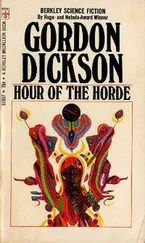Bill shook himself abruptly and stood up. A complete silence held the forest. He turned, and moving with a silence that was the result of his long practice and competitions, he found his way back to the cliff edge and followed it around to the valley’s entrance. There, working along by moonlight, he measured the angle of the drop from the turn in the trail leading to the stockade gates some fifty yards away and then paced off the distance from the turn to the gates, in order to measure it exactly. Having done this he returned up around the cliff edge to the top of the notch, where Bone Breaker had left him. Hauling up his rope and once more rewinding it around his waist under his shirt, he scooped out with his hands a small depression in the lea of a large boulder at the cliff top, built a rough bower of branches around it, and then curled up inside the primitive shelter he had so created. It was no worse and a good deal better than many of the same shelters he had created in Survival School, back on Earth. Curled up within it, his own body heat, reflected from the rock behind him and trapped by the enclosing branches, soon made him comfortable… and he slept.
Bill woke to the confused impression that he was flying through the air. The jolt with which he landed brought him fully awake. He found himself being carried. For a moment he hung there, trying to puzzle things out as the mists of sleep evaporated.
Then it came to him. Evidently the Bluffer, coming and finding him asleep, had simply picked him up and plunked him in the saddle without further notice. This was entirely in line with the Dilbian way of doing things. There was even a sort of horrible humor to the situation. Bill opened his mouth and laughed—only the laugh came out more like a croak.
“Alive up there, are you?” queried the Bluffer, without turning his head, or slowing his pace. “You were really sleeping it up, when I found you back there. Have a good night?”
For answer, Bill let go of the Bluffer’s straps with his right hand, fumbled under his belt, and brought out the hammer to the outlaw gong, which he held out in front of the Bluffer’s eyes.
“Well, well!” said the Bluffer cheerfully. “Thought you were going to bring the gong itself, though?”
“This was easier to carry,” said Bill, as indifferently as he could manage. “I suppose it’ll do as well as the gong, to prove that I was down in the valley last night?”
“Why, I guess it would,” replied the Bluffer judiciously. “You couldn’t get either one without going in and out.”
The Bluffer’s tone of approval it seemed to Bill, however, left something to be desired.
“Why?” asked Bill. “Something wrong with getting into Outlaw Valley by climbing down the cliffs and climbing back up them to get out again?”
“Wrong? No, I wouldn’t say so,” replied the Bluffer thoughtfully, “but it’s just another thing that a Shorty might be able to do that a man couldn’t do—not because the Shorty wasn’t being better than a man at doing it, but because the Shorty was so small that it was easier for him to do it. Like crawling into a little hole in the ground, one that’d be too small for a real man to crawl into.”
“Oh,” said Bill, suddenly deflated. He himself knew how hard it had been to get up and down that cliff. It had never occurred to him that the difficulties and dangers involved would mean nothing to a Dilbian—simply because a Dilbian would have no means of duplicating them himself. That took climbing a sheer cliff out of the heroic class and put it into the class of magic to Dilbians. No one expected a human, back on Earth, to swim as well as a fish. After all, he wasn’t a fish.
“You see,” said the Bluffer, after a moment. “I just thought I’d let you know how things stand, Pick-and-Shovel. It’s all very well doing tricks—everybody knows you Shorties have got all kinds of tricks up your sleeves. But what kind of good is it going to do us real men and women and children? That’s what we want to know! So if you’ll go around and climb up on my back again, we’ll get going toward the village.”
Bill did as the Bluffer suggested, in silence. And that same thoughtful silence he maintained until they entered the main street of the village itself. Nor did the Bluffer seem disposed to interrupt him.
However, when they came in sight of the Residency, and the Bluffer seemed headed past that building on toward the blacksmith shop, Bill roused himself to protest.
“Hey!” he said, leaning forward toward the Bluffer’s right ear. “Let me down here. I’ve got some things to do before I start talking to people—and one of them is getting something in the way of breakfast. I suppose you didn’t think of the fact I haven’t had anything to eat yet today?”
“You know,” said the Bluffer in a tone of wonder, “it did slip my mind at that. Well, I suppose it’s natural. If a man’s had breakfast himself, he naturally assumes everybody else has too.”
“I’ll see you in about half an hour, up at the forge,” said Bill, heading in toward the Residency.
There were some things he desperately needed to learn before he faced any assemblage of villagers. That was his main reason for stopping—but it was nonetheless true that he did need breakfast. He went first to the kitchen therefore, and it was not until he had surrounded a meal that was almost Dilbian in its proportion that he turned to his search for the information he wanted.
He found it easily enough in the information computer—a complete account of the nursery tale of the Three Little Pigs, and a concise account of methods and tactics in medieval warfare. Having absorbed this information, he put the gong handle through his belt—from which he had removed it for the sake of comfort, while eating breakfast—and went out of the Residency and up the street toward the blacksmithy.
He found not only the blacksmith there with the Hill Bluffer but a fair sprinkling of other citizens of the village, and others began to come out of their various houses and follow him up as he approached the blacksmith shop, until he had quite a crowd surrounding him as he stepped in under the roof of the open shed to greet the Bluffer and Flat Fingers.
“Morning, Pick-and-Shovel,” the blacksmith replied, his eyes fastened on the object tucked under Bill’s belt. “I’ve got your blade and buckler ready. Want to try them out?”
“In a minute,” replied Bill, with elaborate casualness. “You don’t have a nail and a hammer you could lend me, do you?”
“Why, I guess so,” replied the blacksmith. He turned to one of the tables nearby, searched among the litter that covered it, and came up with something rather like a short sledgehammer and one of the nails he had made himself from the native iron.
The sledgehammer was difficult to handle with one hand, while holding the nail. The nail itself was some eight inches in length, a triangular sliver of gray native iron, with a bulge at one end for a head and a rather blunt point at the other. Nonetheless, Bill managed to knock it partway into one of the upright posts supporting the shed roof. Then he returned the sledgehammer to the blacksmith, took the gong hammer from his belt, and hung it by the hole in one end of its handle from the nail he had just driven into the pole.
A pleased mutter of deep-voiced and admiring comment went through the crowd that now surrounded the blacksmith shed closely. The blacksmith squinted at the gong hammer.
“Yes,” he said, after a minute. “I remember cutting that piece of iron for Bone Breaker, myself. That must have been eight-ten years ago. Before that they were sounding their gong with just a chunk of wood.”
He turned to face Bill. Behind and above the singed fur of the blacksmith’s broad right shoulder, Bill saw the face of the Hill Bluffer looking at him expectantly.
Читать дальше
